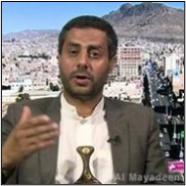Overview
Mohammed al-Bukhaiti is a senior political official and spokesman for Yemen’s Houthi rebels, a.k.a. Ansar Allah.“What is happening in Yemen?,” Brookings Institution, September 11, 2019, https://www.brookings.edu/events/what-is-happening-in-yemen/. Since the Houthis launched their 2014 revolution against the Yemeni government, Bukhaiti has defended the Houthis’ actions to international media. According to Bukhaiti, the Houthi movement is a “national movement that strongly subscribes to the principles of Arab nationalism and pan-Islamism.”“Q&A: What do the Houthis want?,” Al Jazeera, October 2, 2014, https://www.aljazeera.com/news/2014/10/2/qa-what-do-the-houthis-want.
According to Bukhaiti, Yemen’s 2014 revolution—in which the Houthis seized control of parts of the country culminating in the Houthis’ capture of the Yemeni capital of Sanaa in February 2015—was a revolution against the interference of the United States and other international powers in Yemeni affairs. Bukhaiti has argued that Yemen reclaimed its independence in 2014. Referring to the Saudi-led Arab coalition fighting against the Houthis, Bukhaiti has claimed international aggression against Yemen is an attempt to take away the country’s sovereignty.“What is happening in Yemen?,” Brookings Institution, September 11, 2019, https://www.brookings.edu/events/what-is-happening-in-yemen/. According to Bukhaiti, the Houthis’ capture of Yemeni capital of Sanaa was meant to ensure the country’s security.“Q&A: What do the Houthis want?,” Al Jazeera, October 2, 2014, https://www.aljazeera.com/news/2014/10/2/qa-what-do-the-houthis-want. Bukhaiti has accused former Yemeni President Abd Rabbuh Mansour Hadi of aligning with Islamist militants, in particular the Muslim Brotherhood, al-Qaeda, and Salafi Islamists.“Houthis say defending Yemen against militants, not targeting Aden,” Reuters, March 24, 2015, https://www.reuters.com/article/idUSKBN0MK1K420150324. Bukhaiti claims the Houthis do not want to govern Yemen and will withdraw when an agreement is implemented to guarantee security.“Q&A: What do the Houthis want?,” Al Jazeera, October 2, 2014, https://www.aljazeera.com/news/2014/10/2/qa-what-do-the-houthis-want.
Bukhaiti has claimed the Houthis do not rely on Iranian support,“Houthis can defend Yemen without Iran help: official,” Reuters, March 26, 2016, https://www.reuters.com/article/idUSKBN0MM0JB20150326. but he has voiced pro-Iran views and spoken out against that country’s enemies. The Houthis share a common position with Hezbollah, Palestinian Islamic Jihad, and Iran toward the United States and Israel, according to Bukhaiti. While defending Iran in September 2019 against accusations the Islamic Republic was ultimately responsible for a recent Houthi drone attack inside Saudi Arabia, Bukhaiti accused the U.S. Trump administration of “political bankruptcy.”Jon Gambrell and Zeke Mille, “Trump: US locked and loaded for response to attack on Saudis,” Associated Press, September 15, 2019, https://apnews.com/article/269744b35e16422fa746b0c1504ceb4f.
Associated Groups
- Extremist entity
- Houthis
- Read Threat Report
- Type(s) of Organization:
- Insurgent, religious, social services provider, territory-controlling, violent
- Ideologies and Affiliations:
- Arab nationalist, jihadist, Islamist, Shiite, Zaidi
- Position(s):
- Spokesman and member of the Houthi Political Council
The Houthis are an Iranian-backed, Shiite Muslim armed religious and political movement in Yemen. The Houthis waged a series of bloody insurgencies against the Yemeni government for over a decade, leading to that regime’s overthrow in 2015.
